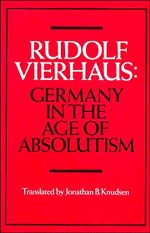Conclusion: Germany at the End of the Seven Years War
Published online by Cambridge University Press: 05 June 2012
Summary
Just as the seven-year-long double war burst the bonds of cabinet wars, so, too, did the peace settlements of Paris and Hubertusburg go far beyond the framework of cabinet foreign policy in their collective historical significance. The first confirmed England's triumph over France in the colonial world and guaranteed English supremacy on the high seas until the end of the nineteenth century. The second confirmed Prussia's emergence as a competing power with Austria on German soil. Unlike the Peace of Paris, that of Hubertusburg did not cause borders to be recast or rulers to be changed. Austria could not regain Silesia and, even with her allies, she was not able to destroy Prussia. Prussia had triumphed but was not able to prevent the lengthy Russian occupation of East Prussia. She also had been unable to destroy her enemies and gained no new territories for all her sacrifices in the war.
Prussian plans with Hanover–England to secularize the bishoprics of northwest Germany had come to naught after the death in 1761 of the archbishop of Cologne (and bishop of Miinster, Paderborn, and Hildesheim). Not all imperial estates had supported the declaration of an imperial war against Prussia, but those who had joined the war had failed, and Prussia remained “unpunished.” In spite of this the imperial system remained intact: the Prussian king was still an imperial prince as the elector of Brandenburg.
- Type
- Chapter
- Information
- Germany in the Age of Absolutism , pp. 144 - 146Publisher: Cambridge University PressPrint publication year: 1989



